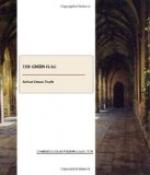“What’s the time?” he cried, in a voice which appeared to be the only sober thing about him.
It was on the clerk’s lips to say that it was time that the questioner was in his bed, but it is not safe upon a campaign to be ironical at the expense of khaki-clad men. He contented himself, therefore, with the bald statement that it was after two. But no retort that he could have devised could have had a more crushing effect. The voice turned drunken also, and the man caught at the door-post to uphold him.
“Two o’clock! I’m done after all!” said he. His head was tied up in a bloody handkerchief, his face was crimson, and he stood with his legs crooked as if the pith had all gone out of his back. The clerk began to realise that something out of the ordinary was in the wind.
“How long does it take to get a wire to London?”
“About two hours.”
“And it’s two now. I could not get it there before four.”
“Before three.”
“Four.”
“No, three.”
“But you said two hours.”
“Yes, but there’s more than an hour’s difference in longitude.”
“By Heaven, I’ll do it yet!” cried Anerley, and staggering to a packing-case, he began the dictation of his famous despatch.
And so it came about that the Gazette had a long column, with headlines like an epitaph, when the sheets of the Intelligence and the Courier were as blank as the faces of their editors. And so, too, it happened that when two weary men, upon two foundered horses, arrived about four in the morning at the Sarras post-office, they looked at each other in silence and departed noiselessly, with the conviction that there are some situations with which the English language is not capable of dealing.
The New Catacomb
“Look here, Burger,” said Kennedy, “I do wish that you would confide in me.”
The two famous students of Roman remains sat together in Kennedy’s comfortable room overlooking the Corso. The night was cold, and they had both pulled up their chairs to the unsatisfactory Italian stove which threw out a zone of stuffiness rather than of warmth.




